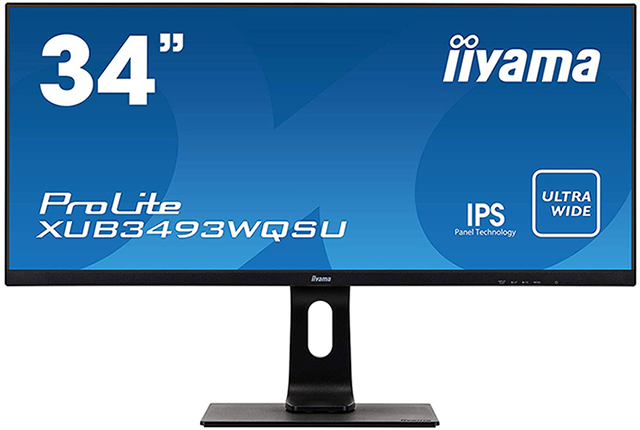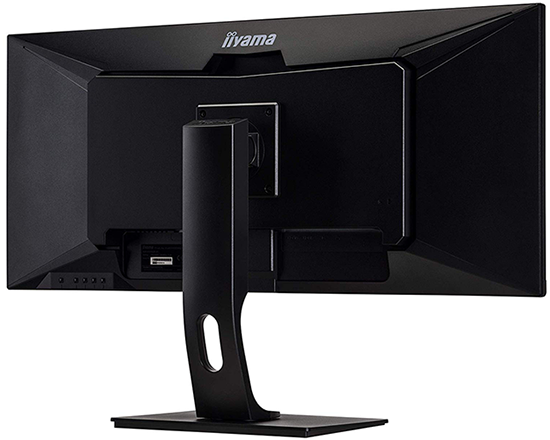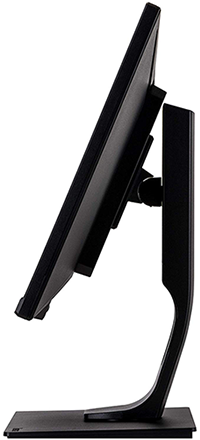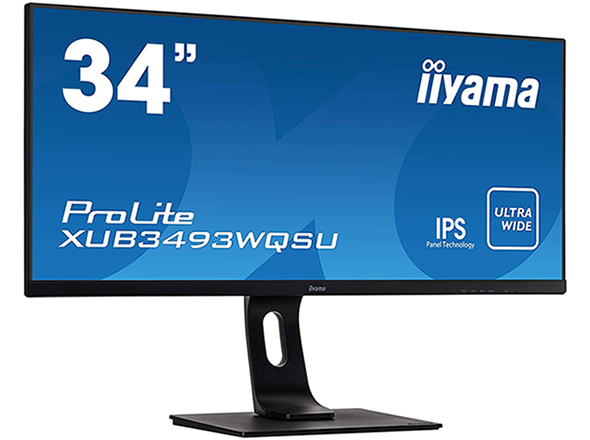Introduction
I love a good ultrawide monitor. For me, a flat, wide canvas is great for productivity, and I'm also partial to racing games, which in my opinion look terrific at a UWQHD resolution. Trouble is, a good-sized ultrawide, with decent specs, can cost a pretty penny. Top-end gaming solutions fetch north of £2,000, and creative types wanting to stretch out to 32:9 can expect to pay around £850 for the privilege.
But can an enjoyable ultrawide experience be achieved at vastly reduced cost? To find out, we're taking a closer look at the iiyama ProLite XUB3493WQSU, a 34in IPS panel touting a 3,440x1,440 resolution and FreeSync support at up to 75Hz for a mere £350.
That price tag is more in keeping with my budget, and first impressions are positive as the iiyama doesn't feel like a cheap imitation. On the contrary, the top and side bezels are suitably slim, there are no gaudy additions to the sleek-black chassis, and the overall profile is reasonably thin despite an integrated power supply resulting in no external brick.
It is a tidy-looking piece of kit, though do be aware of its size; overall dimensions of 817mm (W) x 415mm (H) x 230mm (D) require a good-sized desk, and maximum height extends to 545mm. Finding an optimal viewing position isn't difficult as the easily assembled stand provides ample flexibility. In addition to the 130mm of height adjustment, there's 90º swivel, as well as +22º/-3º tilt, and the arm attachment curiously offers the ability to pivot. We say curiously as the stand isn't tall enough to accommodate a portrait orientation. Being able to pivot even a little bit does make it easier to attach cables, though we do wish the monitor would snap into place when exactly horizontal - it is all too easy to nudge it a degree or two off axis.
From the outside, there's not a lot to criticise. iiyama's clean OSD is navigated through a series of four buttons located in the rear bottom-right corner, alongside the power button, and though the control system isn't quite as intuitive as a joystick, tactile buttons are much preferred over touch-sensitive controls. The stand is also easily removed to reveal a widely compatible 100mm VESA mount, and while the integrated 5W stereo speakers are short on clarity, they deliver a token amount of bass and are fine for everyday office use or the occasional YouTube clip.
The question mark at this price point is whether or not the display panel itself is up to scratch. Well, as you might expect, it's good, but not without limitations. Generous 178º horizontal viewing angles are a plus point, with the matte finish also helping aid visibility, however while brightness is decent at up to 400 nits, static contrast is officially rated at only 1,000:1.
For a monitor that supports HDR, both black levels and contrast are decidedly weak, so much so that while HDR can be enabled, it feels like a token gesture as the panel doesn't have the capability to deliver anything close to an enjoyable HDR experience. It is also worth pointing out that HDR and FreeSync are mutually exclusive on the ProLite XUB3493WQSU - enabling one deactivates the other - and having to choose between the two, we'd opt to keep HDR turned off at all times.
Our testing also reveals below-average out-the-box colour accuracy, yet while content creators may be disappointed, the image appears vibrant and likeable to the naked eye. Productivity is where the 3,440x1,440 resolution comes into its own - working with multiple windows side-by-side is a real boon - and iiyama supports picture-in-picture across a choice of inputs. To our pleasant surprise, the IPS panel's gaming credentials are also satisfactory. A 4ms response time isn't extraordinary, yet action feels quick and smooth, with little sign of motion blur, and though FreeSync support is limited to between 48 and 75Hz, with no support for low-framerate compensation, the end result is noticeably smooth provided you hit that sweet spot. It's G-Sync compatible, too, so GeForce users can look forward to a similarly tear-free gaming experience.
Not every game takes full advantage of the UWQHD resolution - some won't natively support the 21:9 aspect ratio at all - yet in the right title the results can be impressive. The biggest drawback, we feel, is the backlight bleed and clouding that's really quite evident on our review sample. Such imperfections don't tend to impinge on regular desktop work, but when watching multimedia or playing games with dark scenes, the bleed can be quite distracting.
There are, of course, superior ultrawide panels out there, yet we reckon iiyama has done well to present a solid all-rounder at under £350. The multipurpose credentials are bolstered by two HDMI 2.0 inputs, a DisplayPort 1.2, a headphone connector and a dual-port USB 3.0 hub. It's a shame the USB ports aren't located on the monitor's side for easier access - they're hard to reach when sandwiched alongside the display inputs - yet iiyama has the makings of an attractive UWQHD solution that won't break the bank. Let's see what the benchmarks have to say before passing judgement.






